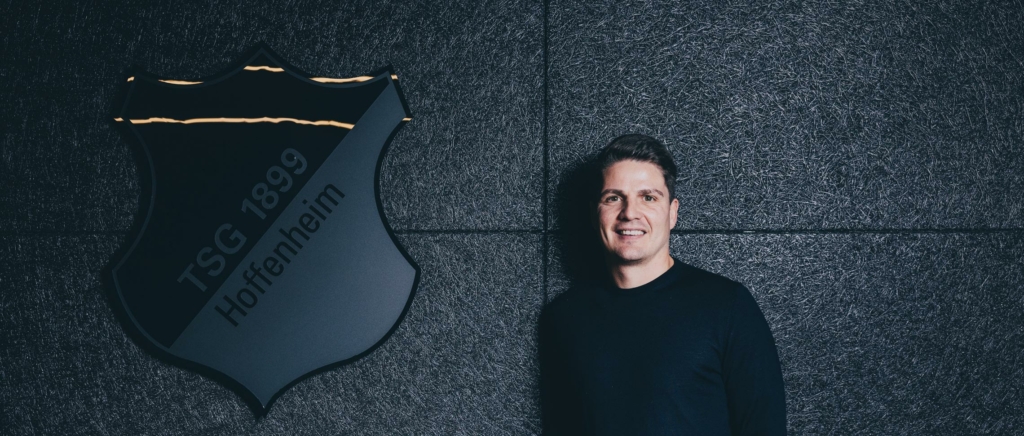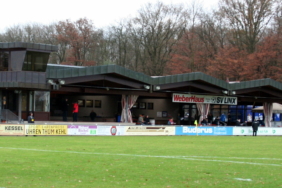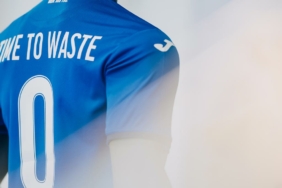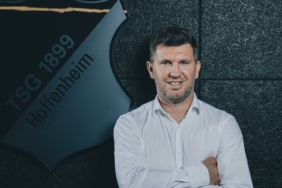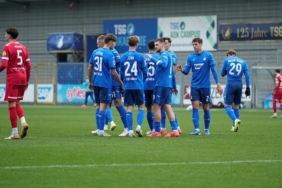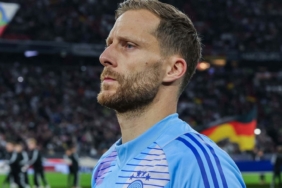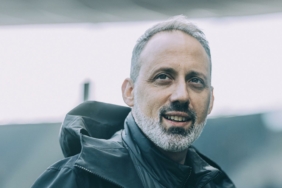Pirmin, you returned to TSG in January 2023 after spending three years as a player here from 2014 to 2017, in which Hoffenheim qualified for European competition for the first time. In the summer, you were appointed director of football. How is it for you to be back here?
“Put simply, I really enjoy being here. I had a great time back then as an active player, even if it was only three years. I learnt to love the club and the people here during that time. I’m happy to be back here – and to find a cool job that I can totally identify with. Because I fully believe in the Hoffenheim approach of offering youngsters a platform.”
Were you conscious of this special Hoffenheim approach in your time as a player?
“Definitely. And that’s despite the fact that, when I was a player here, I wasn’t a youngster who fitted in one-hundred percent with this core DNA. But having more experienced guys on board to help the young players make progress is part of the process. This concept of supporting young people, mentoring them and helping them to develop.
A few people were surprised by your move. After all, your previous job was as chief scout at German record champions Bayern Munich…
“For me, metaphorically speaking, it’s not what the bottle looks like that counts, but rather what’s inside. It’s not the packaging that is important, but the contents. And here I can work with people every day who want to make a difference together, I can bring myself and my personality to the table and play my part. I really don’t want to make myself and my position within the club too big, because that’s not my style either – but I definitely feel that I can be a decisive part of making a difference here. I’m also very close to the team here in Hoffenheim. I haven’t consciously sought or pushed for this closeness. But I realise that it gives me great pleasure and is enormously beneficial in my day-to-day work.”
What is your everyday contact with the team like?
“I’m involved in training sessions as much as I can, but I tend to stay in the background. I think that’s important, because the key people on the pitch are the players and the coaching team. I play the role of observer and try to gather lots of observations so that I can perhaps address things internally with the players or the coach sooner rather than later if in doubt. But it’s not at all the case that I’m constantly interfering. I’m very good at taking a step back. I also see myself as a link to Alexander Rosen, the managing director, Bastian Huber, the technical director, and Max Vollmar, the head of the licensed player department. In the end, you need good teamwork in the sporting management of a club – just the same as in a coaching team.”
You mentioned the head coach. What is your relationship like with Pellegrino Matarazzo?
“We exchange ideas everyday and talk about lots of different topics. It’s all on an eye-to-eye level and a lot of fun. It sometimes goes deeper into content and can end in a real discussion. Such constructive and trusting collaboration is important in order to approach certain subjects together in the right way as soon as required.”
There are also players in the squad with whom you yourself have played on the pitch. Does that present a special challenge in your new role?
“Not at all for me personally. It’s always about being honest with each other, regardless of who we’re talking about. That’s definitely a priority for me, because even as a player I totally appreciated receiving honest feedback. It shows that someone is genuinely interested in you as a person. That’s also part of my personality. I present myself as I am.”
You mention the authenticity factor. To what extent do you have to act differently in public in the more prominent position you now hold?
“I consciously ask myself whether I have to play a role. My answer to that is: I don’t think so. I always try to be authentic because the other person can sense that. I want to be allowed to be myself – and stay that way. Of course, if the situation calls for it, I can get a little more angry. But that’s an honest reaction. It comes out of me when I feel that something is not going in the right direction. But you don’t have to shout, you just have to be clear in your communication. I think it can all be done in a matter-of-fact way. But feel free to ask me all this again in ten years’ time.” (laughs)
You’ve worked for five Bundesliga clubs in total. Without disparaging the others, what is it that makes TSG special?
“I have enjoyed everywhere I’ve been – but in the end, you come here for the football. Without much background noise, the focus is solely on the sport. Everything here revolves around the question: how can you create the best conditions for something great to happen on the pitch? This includes not just talking about wanting to be innovative, but actually taking action in this regard. Dietmar Hopp’s fundamental concept of promoting youth development as top-level performance also plays a major role. For me, that is a special feature. Ultimately, however, it’s all about the people. That also applies to my work in squad planning: it definitely doesn’t work without the right character and without paying attention to the human side of a player. Nevertheless, the scientific data, for example, helps us to get a complete picture. I would put it like this overall: if the human element isn’t right, even the best scientific data won’t help. On the other hand, a good character alone is not enough to be able to play in the Bundesliga. It’s a very complex picture.”
You mentioned the goal of youth development. How committed are you to helping TSG’s young talents make it to the Bundesliga?
“Of course that spurs me on. I don’t just want the lads to get a place in the squad. I want to help the boys develop so that they are regularly considered for the first XI and get regular playing time. Now some of you might ask: why did you bring in two or three older players in the summer? These more mature characters have an important role to play. Because players like Wout Weghorst, for example, who can be uncomfortably direct at times, help to highlight areas that need improvement and help the lads to develop further.”
After Maximilian Beier, who established himself in the team very quickly, and Tom Bischof, the coach also recently handed Bambasé Conté his first-team debut.
“We’re delighted about that, of course. These boys have definitely worked hard and earned it. That’s how it should and must be. The coach will always line up according to the performance principle. Our aim must therefore be to get the boys to the point where the coach will always consider them for the starting line-up. Here at TSG, we create the right environment and build a platform on which they can work to the best of their ability. This is an important and crucial pillar of our club, of our squad – and we want to keep it that way in the future.”
To what extent did the club change in the years you were away?
“The DNA and the basic idea have remained the same – at the same time, football is evolving everywhere. That’s why it’s fundamental that you don’t stand still, that you take new steps as a club – and that has definitely happened. But it’s not something that’s done in one day, it’s an ongoing process. I’m excited to be part of it.”
And how far has football evolved compared to when you were starting out as a player?
“Football always moves in waves. What was ‘in’ 20 years ago disappears first and then often comes back under a new name. One thing is clear: football has definitely become more athletic. I wasn’t the fastest back then and I certainly wouldn’t be today. (laughs) On the other hand, today we always say: we need guys who are quick in the head, who can read a game. And that, in turn, was certainly one of my greatest strengths. So in a way, it’s perhaps not so different from the past. What has changed fundamentally, however, is the public environment; the media landscape, for example, has been completely transformed. I’m glad that I was still able to experience a time when, as a player, you could go somewhere and do something without it being filmed, published on a network and shared everywhere a second later. I don’t necessarily want to be a part of that today either. But that’s not just a football phenomenon.”
Are the demands made on young players in this regard much higher today?
“Yes, without a doubt. Of course we’re talking about Bundesliga players, about professionals, but first and foremost we’re talking about people. And all young players should remain human beings, they should be allowed to enjoy their freedom and gain experience. But we often take that away from them, we don’t allow them to take this step. I’m glad that I was able to try things out and make mistakes. That’s important, because it’s the only way to grow. That’s what I tell the lads here in Hoffenheim. That’s life. It’s not always a straight line that goes upwards, you also fall down sometimes, go through a difficult patch. Everyone has to experience that, it’s definitely important and we can’t take that away from them out of a misguided sense of care.”
What is your role as a club director in this regard?
“As I said before: development is not a straight line. There is no cable car that takes you comfortably up the mountain. You first have to climb the mountain yourself, otherwise you won’t know how you got there. As a player, I used to stand in front of a mountain and think I couldn’t get up there – I experienced bumps along the way, but in the end they only made me stronger. That’s why I think it’s important that you don’t take everything off the boys’ shoulders, but that everyone has to go their own way. We support the boys a lot, even off the pitch. But on the pitch, everyone has to function and make decisions on their own. How is a player supposed to get there if he never has to do it outside of the 90 minutes? They all have to make their own experiences, and no coach or sporting director can take that away from them. That’s just normal life. As a player, you have to put yourself in that situation so often that, when you’re through in front of goal on a Saturday afternoon, you stay calm and know what to do.”

Jetzt 11 Ausgaben kostenlos* abonnieren!
(*jahrliche Bezugskosten nur 18,99 €)

